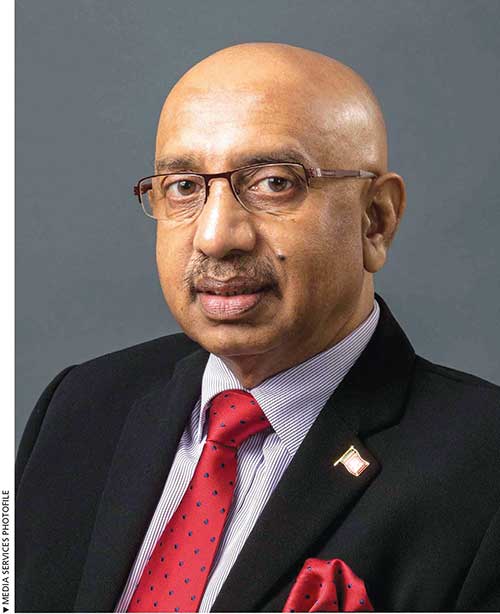PROTECTING THE SME SECTOR
Keerthi Gunawardane advocates for SME support through strategic collaboration

Q: What key projects is the Federation of Chambers of Commerce and Industry of Sri Lanka (FCCISL) currently involved in – and what are their main objectives?
A: FCCISL is actively engaged in several key projects aimed at supporting economic growth and development.
In SME development, we focus on enhancing competitiveness by providing capacity building, access to finance and market linkages, to help small and medium-size enterprises scale up and contribute to the economy.
We also advocate for business friendly policies, pushing for reforms to streamline regulations, improve tax policies and address labour market issues to create a more conducive environment for businesses.
In promoting sustainable business practices, the federation supports renewable energy, energy efficiency and green industry projects, to encourage eco-friendly practices and contribute to the UN Sustainable Development Goals (SDGs).
To support Industry 4.0, FCCISL – in collaboration with Western Sydney University and the Ministry of Industries – has launched initiatives to help industries adopt advanced technologies and assess organisational gaps.
FCCISL also promotes trade and investment, working to attract foreign direct investments (FDIs), and expand trade partnerships through international delegations, trade fairs and business forums.
Additionally, the federation focusses on regional development, empowering local chambers and fostering rural economic growth by integrating regional economies into national development plans, reducing disparities and supporting local businesses.
Q: How is FCCISL supporting SMEs in Sri Lanka – especially those in the hospitality sector?
A: The federation has played a key role in fostering economic growth with a strong focus on supporting micro, small and medium-size enterprises (MSMEs), particularly in the hospitality sector.
To this end, the chamber has prioritised enhancing small hotels and homestay businesses.
One notable initiative is the FCCISL and Skills for Inclusive Growth (S4IG) programme, supported by the Australian government. This programme equips hospitality businesses with essential skills in service quality, operational efficiency and sustainable tourism, while promoting community based tourism by integrating cultural experiences and values.
FCCISL also provides business and marketing support to help small hotels and homestays improve their online presence and marketing strategies, boosting credibility and customer trust.
To extend its impact further, FCCISL has developed a network of industry specific coaches who provide targeted mentorship in areas like financial management, customer service and quality certifications.
Through initiatives such as S4IG and skilled coaching, the chamber continues to strengthen the hospitality sector and other industries, promoting a more inclusive and competitive business environment in Sri Lanka.
Q: Could you cite a few success stories that have made a significant impact on the local business and industry landscape?
A: S4IG and FCCISL’s development of Digital Content Development Coaches has significantly impacted Sri Lanka’s hospitality sector, particularly small hotels and homestays.
These coaches have helped businesses transform their digital presence by creating high quality content and setting up Google My Business accounts, leading to increased online visibility.
As a result, many local hospitality businesses have enjoyed rapid growth in customer engagement and bookings, and revenue increasing by over 1,000 percent within months. The initiative not only boosted revenue but also empowered entrepreneurs by equipping them with essential digital skills, enabling them to sustain their online presence and business growth.
This success demonstrates the potential of digital tools in driving local economic development.
Q: How does the chamber work with both the private and public sectors to lobby for important industry initiatives?
A: FCCISL plays a vital role in connecting the private and public sectors to advocate for industry friendly policies.
By working with government agencies, business associations and international organisations, the chamber ensures that industry voices are heard, leading to impactful reforms.
In the case of MSME and SME support, FCCISL has secured tax incentives, financial assistance and regulatory reforms, resulting in funding programmes and training initiatives to help small businesses to grow.
For tourism development, FCCISL promotes sustainable tourism by advocating for better infrastructure, quality standards and marketing strategies, benefitting small hotels and local communities.
In renewable energy, the chamber has been instrumental in lobbying for policies that promote green technologies, advancing the country’s sustainability goals.
And through trade and investment reforms, FCCISL has streamlined import-export processes and enhanced market access, attracting FDIs by improving Sri Lanka’s ratings, which have declined substantially.
These efforts enable FCCISL to influence policy, fostering industry development and long-term economic growth in Sri Lanka.
Q: What challenges has FCCISL faced in driving these projects forward, particularly in the current policy environment?
A: FCCISL has faced major challenges in driving its initiatives forward, particularly under the previous government, which was reluctant to incorporate inputs from business chambers.
This lack of collaboration hindered effective policy-making, leading to missed opportunities in areas like SME support, tourism development and sustainable growth.
As a result, many government led efforts failed to achieve their intended outcomes, highlighting the need for a more inclusive approach that values the perspectives of the private sector and business associations.
Despite these setbacks, FCCISL continues to advocate for meaningful reforms, striving to create a more supportive policy environment for economic development.
Keerthi Gunawardane is the President of the Federation of Chambers of Commerce and Industry of Sri Lanka.
The federation has played a key role in fostering economic growth with a strong focus on supporting… MSMEs, particularly in the hospitality sector

ABOUT THE FEDERATION OF CHAMBERS OF COMMERCE AND INDUSTRY OF SRI LANKA
The Federation of Chambers of Commerce and Industry of Sri Lanka (FCCISL) is the apex body representing the business community in this country. Established to promote and advocate for private sector growth, FCCISL plays a vital role in advancing trade, investment and economic development across the island.
It actively supports micro, small and medium-size enterprises (MSMEs) and SMEs, fosters regional economic integration and engages in policy advocacy to create a conducive business environment.
Through trade fairs, skills development programmes and sustainable initiatives, FCCISL strengthens local industries and enhances Sri Lanka’s global trade relations, thereby contributing to the nation’s economic resilience and long-term growth.
Telephone: 7390860 | Email: info@fccisl.lk | Website: www.fccisl.lk
